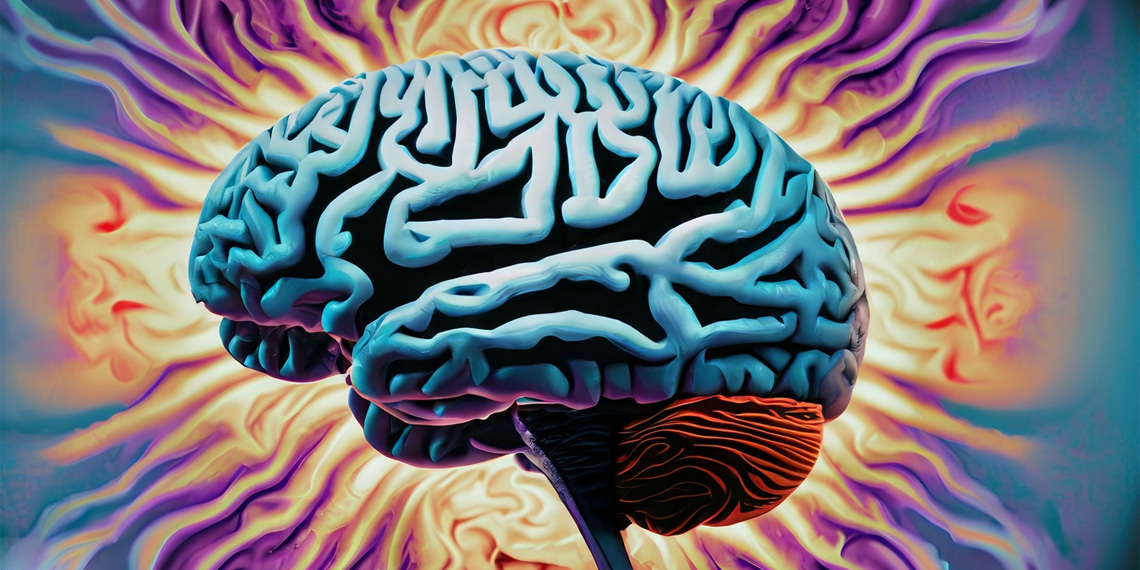
The psychedelic drug lysergic acid diethylamide (LSD) make people learn faster when receiving feedback and enhances exploratory behavior, according to new research published in Psychological Medicine. The findings could help shed light on the underlying cognitive mechanisms behind the potential therapeutic effects of LSD.
LSD-assisted psychotherapy has shown promise in the treatment of conditions such as anxiety, depression, and post-traumatic stress disorder, although it is still illegal in most countries. The drug, when used in a controlled setting under the guidance of a trained therapist, is believed to enhance the patient’s ability to explore and process difficult emotions and experiences, leading to insights and potential breakthroughs in therapy.
“The potential therapeutic effects of LSD may involve new beneficial learning about the world, such as forming new associations,” said study author Jonathan Kanen, a Gates Cambridge Scholar and an incoming psychiatry resident at The Mount Sinai Hospital in New York City.
“An important way by which psychedelic drugs, such as LSD, act is through increasing serotonin signals in a unique way, through stimulating the serotonin 2A receptor — this is known to be involved in learning and flexible thinking. Few studies, however, have examined how LSD affects learning through trial and error in humans.”
Kanen and his colleagues aimed to investigate the effects of LSD on learning and decision-making in humans, with the ultimate goal of identifying the psychological mechanisms by which LSD could have potential therapeutic benefits for mental health. The researchers used a task called probabilistic reversal learning (PRL) to assess how participants made choices under uncertainty and how they adapted their behavior based on feedback.
The study included 19 healthy volunteers who were over the age of 21. Each participant attended two sessions that were at least two weeks apart. In each session, the participant received either LSD or a placebo in a single-blind within-subjects balanced-order design before completing a PRL task. This means that each participant received both LSD and placebo, but the order in which they received them was randomly determined and counterbalanced across participants.
The LSD dose was 75 μg (a moderate dose), which was administered intravenously in 10mL saline solution. The placebo was also administered in 10mL saline solution, but did not contain LSD.
The PRL task involved presenting participants with three visual stimuli and asking them to choose one of them. In the first half of the task, one of the stimuli was associated with positive feedback on 75% of trials, another with positive feedback on 50% of trials, and the third with positive feedback on only 25% of trials. After 40 trials, the probabilities associated with each stimulus were reversed, so the stimulus that was previously correct 75% of the time was now correct only 25% of the time, and vice versa.
The researchers used both classical statistics and computational models of reinforcement learning to analyze the data. Classical statistics allowed them to measure how LSD affected overt choice behavior during the PRL task, while computational models of reinforcement learning allowed them to investigate the underlying learning mechanisms.
Kanen and his colleagues found that LSD increased the speed at which participants updated their expectations based on feedback. This means that the participants who took LSD were quicker to learn from their experiences than those who took a placebo.
Additionally, those who took LSD were more exploratory in their behaviour, meaning that they were more likely to try new options when making decisions. The researchers also found that LSD increased the impact of both positive and negative feedback, but it enhanced learning from reward significantly more than it did from punishment.
“LSD enhanced a fundamental learning process,” Kanen told PsyPost. “When something better than expected happens to us, the brain updates our expectations or beliefs about whether something good might happen again if we do the same thing. LSD boosted how rapidly expectations are updated, particularly after better than expected outcomes. This indicates that LSD may make the brain more changeable. These results could be relevant to its potential beneficial effects for people with certain mental illnesses.”
The findings are line with previous research, which has provided preliminary evidence that LSD might enhance learning and memory by promoting brain plasticity.
By enhancing the rate at which people learn from feedback and increasing exploratory behavior, LSD may help individuals with mental health issues break free from negative thought patterns and develop new, more positive associations.
However, Kanen noted that his study only tested the acute effects of LSD, meaning that it only examined the immediate and short-term effects of the drug. Further research would be needed to investigate the potential long-term effects of LSD on learning and decision-making, and how these effects are related to therapeutic outcomes.
“An open question is whether these effects of LSD on learning help us understand how to optimize treatments involving psychedelic drugs,” he told PsyPost. “We studied learning right after administration of LSD — do these effects on learning and flexibility persist after the drug wears off? Whether these effects of LSD generalize to other psychedelic drugs such as psilocybin remains to be tested.”
The study, “Effect of lysergic acid diethylamide (LSD) on reinforcement learning in humans“, was authored by Jonathan W. Kanen, Qiang Luo, Mojtaba Rostami Kandroodi, Rudolf N. Cardinal, Trevor W. Robbins, David J. Nutt, Robin L. Carhart-Harris, and Hanneke E. M. den Ouden.
"behavior" - Google News
May 07, 2023 at 12:05AM
https://ift.tt/SGItORA
LSD enhances learning and exploratory behavior in humans, according to new placebo-controlled research - PsyPost
"behavior" - Google News
https://ift.tt/zXicA4I
Bagikan Berita Ini














0 Response to "LSD enhances learning and exploratory behavior in humans, according to new placebo-controlled research - PsyPost"
Post a Comment